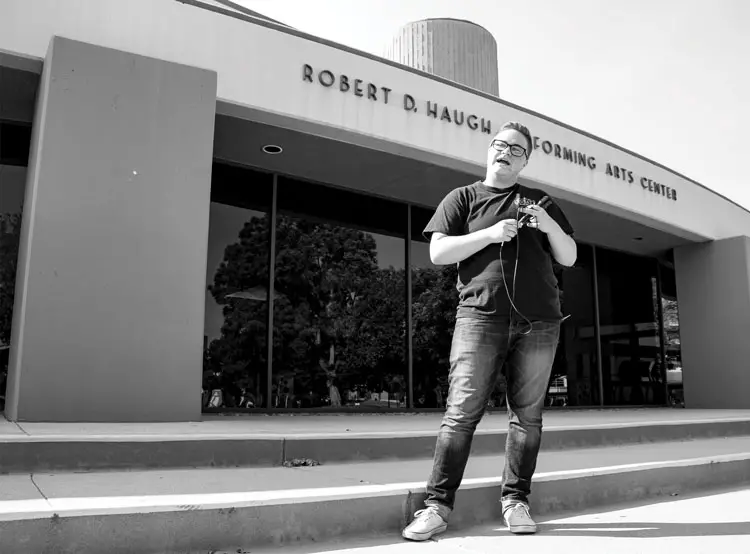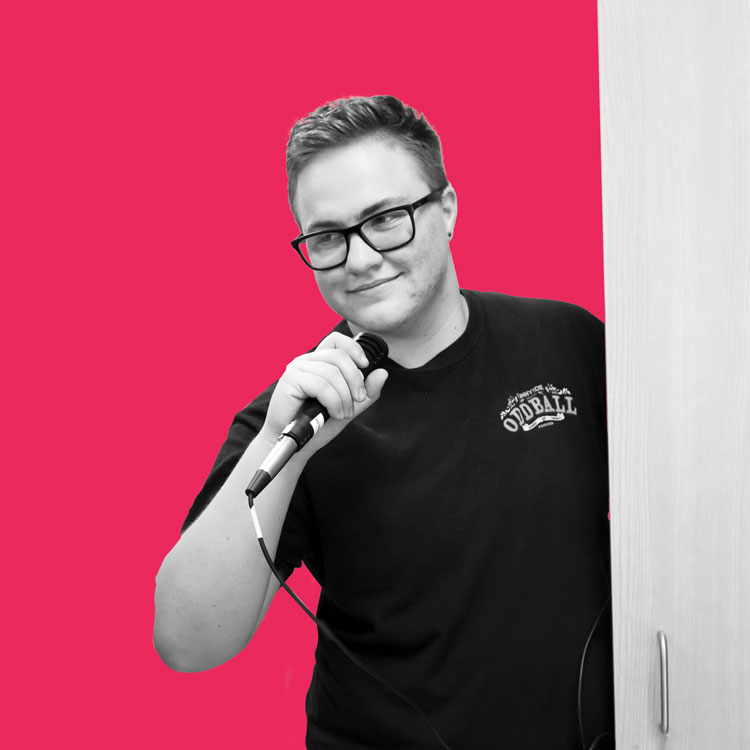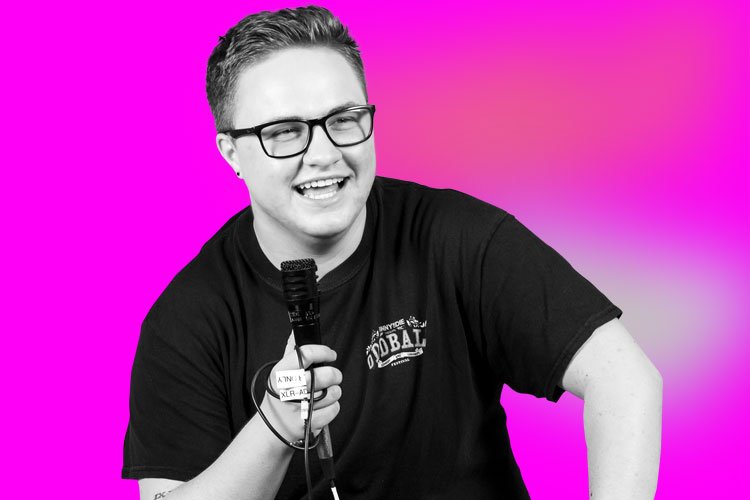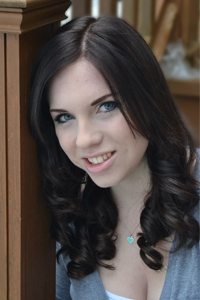Back before Caleb Kline was Caleb Kline, he was a twelve-year-old aspiring comedian, poring over comedy routines online and Facebook messaging “Saturday Night Live” to let them know he’d be making an appearance someday.
Kline may still have his sights set on an “SNL” appearance—he’s still waiting on a reply from their Facebook account—but a lot has changed for the student and comedian, now twenty. In the past two years, the Citrus College student from Monrovia, California, has completed half of his undergrad degree in biology, launched his stand-up career at Flapper’s Comedy Club in Burbank and served up countless Unicorn Frappuccinos as a Starbucks barista, all while transitioning from a biological female to the Caleb audiences are discovering today.
Now over a year into his transition, his experiences as a transgender male have become a stand-out feature of his comedy, and Kline has quickly found himself an educator and activist, as well as an entertainer. Since “coming out of the not gay closet” to the audience at his first Flapper’s showcase in May, Kline has attracted attention from fans and fellow comedians for his witty, eye-opening and refreshingly accessible insights on transitioning and the LGBTQIA community.
Kline’s routine takes a no-holds-barred approach to his transition, leaving out no awkward moment or embarrassing misunderstanding. Covering everything from strangers searching for signs of male genitalia to Caitlin Jenner’s misleadingly glamorous transition, Kline illuminates the familiarity that has always been at the core of a historically misunderstood and underrepresented community.

“I think most people think of Caitlin Jenner when they think of somebody who’s transitioning. I don’t remember Caitlin Jenner’s transition. I just remember one day she walked out, beautiful with a great rack, and she was a woman,” Caleb quipped to his audience at the showcase back in May. “That’s not how it happens when you’re poor,” he concluded to uproarious laughter. “I feel like with a lot of my humor, a big thing I want to do with it is teach people,” says Kline. “I am trying to teach people about the trans community in the sense that I’m trying to show people that we’re all human beings, just like everybody else.”
Unsurprisingly, most people have a lot to learn. Since beginning his transition, Kline has encountered numerous stereotypes and misunderstandings about transitioning and the trans community. Still one of the most pervasive? “That being trans is a mental illness. It’s not,” he says.
For Kline, and much of the trans community, transitioning is the solution, not the problem. Gender dysphoria is a condition many trans individuals, including Kline, identify with prior to their transition. The feeling that one does not identify with their biological gender, a hallmark of gender dysphoria, is not an illness in need of treatment itself. Rather, gender dysphoria refers to the feelings of depression, anxiety and other mental and emotional complications that can result from an incongruity between one’s body and gender, to which transitioning is often pursued as a cure. “I don’t think that a lot of people realize that,” says Kline. “That psychologists and doctors across the world have agreed that this is the best way to help treat gender dysphoria. People still will think that it’s a mental illness when we’re really just average people trying to be ourselves.”
Kline’s own experiences of gender dysphoria began early in life, but, as he says, he didn’t always have a word for it. “The best way I can explain it is I just grew up very uncomfortable with myself. I was always really insecure but I was never entirely sure what I was insecure about,” he says. “I was always dieting or trying to change my body in some sort of way, but it was just something I couldn’t really pinpoint.”
Having grown up in a relatively small town, Kline didn’t know anyone who was transgender, and it wasn’t until his freshman year at UC Santa Cruz that he was introduced to the concept on a more personal level when he became close to a faculty member who was intimately involved with the trans community. “I was like, this makes so much sense, now I know why I just haven’t felt right my entire life,” says Kline of the realization. “It felt like this entire weight was off my shoulders.”
Of course, misconceptions about the trans community go beyond Caitlin Jenner and accusations of mental illness, and, true to form, Kline addresses them in the best way he knows how—with humor. “One thing I hear a lot is people will look at photos of me from before and they’ll be like ‘Oh, you were really pretty?’ with like a question mark at the end of it,” he laughs. “And I’m just like, people don’t transition because they think that they’re ugly and they’re just really hoping that they’ll have a better shot with the other gender. I’m pretty sure some of the most beautiful people could still feel somehow wrong in their body and maybe even be trans.”
“The fact that he’s used his transition in a fun way, with humor and standing up in front of people and trying to make them laugh, which he’s actually pretty good at, it helps people.”
Confusion and misconceptions regarding the trans community aren’t just limited to the straight and cisgender world, however. Even other members of the LGBTQIA community don’t always know the best way to approach transgender issues. “I don’t think a lot of people realize that sexuality and gender are two very different things,” says the comedian. “Being trans is the only part of the LGBT community that is really spoken of that deals specifically with gender, and I think that a lot of people, even within the community, are still very confused about it and just haven’t learned as much about it, because what they’re dealing with is something with their sexuality; it has nothing to do with their gender.”
The gap between LGB and T is very real, the most infamous example coming from the fallen icon of the trans community, Caitlin Jenner, whose esteemed role as a trans activist suffered a precipitous decline after she voiced controversial opinions against gay marriage. “If you’re going to try to be an advocate for the trans community, you should also try to be an advocate for the entire LGBT community,” says Kline. “We’re all in this together. You can’t just leave part of them out.”
With all these misunderstandings about transitioning still prevalent in society, and even within the LGBTQIA community itself, it is no surprise Kline has used comedy as a platform to clear the air, combining his lifelong passion for stand-up with his intuitive understanding of both life in the trans community, as well as other people’s confusion about it.
“Comedy is a great way to introduce new or controversial ideas,” says Joanie Coyote, a fellow comedian and Kline’s instructor during his six-week comedy course at Flappers earlier this year. “I think Caleb has a chance to not only enjoy expressing himself, but also to do a great service for the LGBT community,” continues the comedian, whose own career has included stand-up and improv performances at some of the top clubs in the country alongside performers like George Lopez, Brian Regan and Wanda Sykes, to name a few. “We found a way to turn his life experience into really fun jokes, but he alone was responsible for the charm and likeability of his stage presence.”
Before Kline was enlightening audiences about the uncomfortable realities of transitioning and the very real effects of testosterone on porn watching habits, his first student was his own mother, Margaret Kline.
“I think, surprisingly, the hardest person to tell for me was my mom,” says the young comedian. “She took it pretty hard, which was surprising to me because, as I mention in my stand-up, she’s gay, and so I kind of expected someone who was also in the LGBT community to be more accepting of it. But to her, the way that she was viewing it I guess was that she lost a daughter, in a sense.”
Kline’s mother recalls her initial response similarly. “It took my feet out from under me, took my breath right out of me. I wasn’t at all anticipating this and I hadn’t read the signs correctly. Looking back now, I wish my initial response had been a little bit more advocating for him.” At the time, she says, her response had more to do with fear of what it meant for his future.
Over time however, Margaret came to terms with her son’s transition, and in the process, learned more about the LGBTQIA community, of which she herself is a part. “He has shown me in this year and a few months that he is exactly the same person that he was when he was someone I called by a different name, and that helped me understand that the wrapping and the packaging of something is strictly that,” she says. “He has shown me by his example that you can do this with your head held high, and proud of who you are and who you’re becoming. Seeing that in a kid who, at that point was nineteen turning twenty, was pretty humbling for me. He has shown me bravery, he’s done it with humor, he’s allowed me the time I’ve needed to come up the learning curve and he’s been honest.”
Kline’s mother knows that she isn’t the only one benefitting from her son’s unique approach to raising trans awareness. “The fact that he’s used his transition in a fun way, with humor and standing up in front of people and trying to make them laugh, which he’s actually pretty good at, it helps people. It kind of takes the edge off a topic that can be awkward or difficult,” she says. “I think it gives them some permission to ask questions, because Caleb is willing to laugh at himself and his process a little bit, and it just sort of opens the door a crack for some people who may have been put off by not understanding much about transitioning.”
Despite any early hesitancy on his mother’s part, the young comedian and activist acknowledges that he’s been very fortunate when it comes to the support of his friends and family. “I am so lucky because of it. I know a lot of people don’t get the kind of support I get, so I was very fortunate.”
And while he’s checking his privilege, Kline remains adamant that, although educating people about transitioning is a big part of his comedy, he in no way claims to speak for the entire trans community. “My biggest worry is that I’m going to upset people within the transgender community because they’re going to think that I’m speaking on behalf of all of them,” says the comedian. “What I want to make very clear is that my comedy about transitioning is about my own personal transition; it’s not about anybody else’s. Like I said, I’ve been really fortunate with the people I’ve surrounded myself with and the help I’ve gotten from all the doctors I’ve had, so I don’t want everybody thinking that I’m trying to speak for the entire trans community. I am trying to teach people about the trans community in the sense that I’m trying to show people that we’re all human beings just like everybody else. But the examples that I’m using are just mine and mine alone. I can’t speak for anybody else.”
While Kline may never claim to speak on behalf of the entire trans community, his insights have resonated with enough individuals that the LGBTQIA community has begun actively seeking him out as a representative. Following his performance at the showcase in May, Kline was immediately approached to perform in a June 8 show celebrating Pride Month.
The “Rainbows and Unicorns” show also took place at Flappers, and featured Caleb alongside headliner Jen Kober as well as other prominent LGBTQIA performers. “I was terrified, like, the entire time,” says Kline of his second performance. “I think I was so scared for the second one just because I was performing with comedians who had been doing it for so much longer than me, and I was just a kid who had taken a beginner class.”

Despite Kline’s fears, however, he was a hit, at least according to the show’s producer and emcee, Meera Manek. “When I saw Caleb, I just saw this individual who really could help educate the community about his experience and what it has been like, and really get people to have a better understanding of what these individuals experience as they learn more about themselves,” says Manek, who produces the “99 Percent Funnies” series at Flappers, of which the Pride Month show was a part.
The series, which will soon be known instead as “Laugh, Resist, Repeat,” has a focus on community action and social justice, and frequently teams up with charities and organizations in the Los Angeles area to raise money and awareness for current issues. Last month’s pride show benefitted My Friend’s Place, a homeless youth center in Hollywood. “Forty percent of homeless youths identify as LGBT,” explains Manek, who also co-chairs the Emerging Leaders Council, a group of over a hundred young professionals who support and advance the mission of My Friend’s Place through volunteering and fundraising.
Using comedy as a platform to raise awareness has opened up more doors for Caleb, who has since become a member of the Emerging Leaders Council himself after performing in the pride show. “For those young people to see an individual like Caleb offers them a sense of hope,” says Manek. “My Friend’s Place really enjoyed his coming to them and offering his services, because they could immediately identify with his ability to get the young people to identify with him.”
While Kline’s burgeoning comedy career is still the stuff his dreams are made of, continuing to give back to the LGBTQIA community will always be a top priority, whether he makes it to “SNL” or not. “I’ve become really interested recently in giving back to LGBT youth because a lot of them weren’t as fortunate as I was,” he says. “I’d love to be able to be the kind of support for them that I have had.”

















